Résultats de recherche de titre
Articles 1 à 5 sur 5
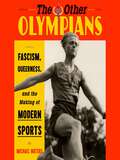
The other olympians: Fascism, queerness, and the making of modern sports
Par Michael Waters. 2024
"Michael Waters performs an Olympian act of storytelling, using the stories of these extraordinary athletes to explore in brilliant detail…
the struggle for understanding and equality." —Jonathan Eig, author of King: A Life The story of the early trans athletes and Olympic bureaucrats who lit the flame for today's culture wars. In December 1935, Zdenek Koubek, one of the most famous sprinters in European women's sports, declared he was now living as a man. Around the same time, the celebrated British field athlete Mark Weston, also assigned female at birth, announced that he, too, was a man. Periodicals and radio programs across the world carried the news; both became global celebrities. A few decades later, they were all but forgotten. And in the wake of their transitions, what could have been a push toward equality became instead, through a confluence of bureaucracy, war, and sheer happenstance, the exact opposite: the now all-too-familiar panic around trans, intersex, and gender nonconforming athletes. In The Other Olympians , Michael Waters uncovers, for the first time, the gripping true stories of Koubek, Weston, and other pioneering trans and intersex athletes from their era. With dogged research and cinematic flair, Waters also tracks how International Olympic Committee members ignored Nazi Germany's atrocities in order to pull off the Berlin Games, a partnership that ultimately influenced the IOC's nearly century-long obsession with surveilling and cataloging gender. Immersive and revelatory, The Other Olympians is a groundbreaking, hidden-in-the-archives marvel, an inspiring call for equality, and an essential contribution toward understanding the contemporary culture wars over gender in sports. A Macmillan Audio production from Farrar, Straus and Giroux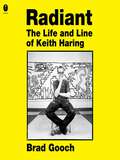
Radiant: The life and line of keith haring
Par Brad Gooch. 2024
A stunning life of the iconic American artist, Keith Haring, by the acclaimed biographer Brad Gooch. In the 1980s, the…
subways of New York City were covered with art. In the stations, black matte sheets were pasted over outdated ads, and unsigned chalk drawings often popped up on these blank spaces. These temporary chalk drawings numbered in the thousands and became synonymous with a city as diverse as it was at war with itself, beset with poverty and crime but alive with art and creative energy. And every single one of these drawings was done by Keith Haring. Keith Haring was one of the most emblematic artists of the 1980s, a figure described by his contemporaries as "a prophet in his life, his person, and his work." Part of an iconic cultural crowd that included Andy Warhol, Madonna, and Basquiat, Haring broke down the barriers between high art and popular culture, creating work that was accessible for all and using it as a means to provoke and inspire radical social change. Haring died of AIDS in 1990. To this day, his influence on our culture remains incontrovertible, and his glamorous, tragically short life has a unique aura of mystery and power. Brad Gooch, noted biographer of Flannery O'Connor and Frank O'Hara, was granted access to Haring's extensive archive. He has written a biography that will become the authoritative work on the artist. Based on interviews with those who knew Haring best and drawing from the rich archival history, Brad Gooch sets out to capture the magic of Keith Haring: a visionary and timeless icon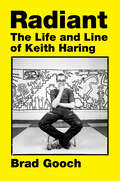
Radiant: The Life and Line of Keith Haring
Par Brad Gooch. 1981
“It’s all here: the grade school Walt Disney and Dr. Seuss; the adolescent acid trips; the fondness for Post-it notes and…
flying saucers; the long tails of Dubuffet and Burroughs; the encounters with Madonna, Warhol, and one game-changer of a subway Johnny Walker Red poster. Brad Gooch takes us deep into Keith Haring’s imagination while somehow managing to fix the aura and energy of the 1980s New York art scene to the page. A keen-eyed, beautifully written biography, atmospheric, exuberant, and as radiant as they come.”—Stacy Schiff, Pulitzer Prize winning author of The Revolutionary: Sam AdamsA stunning life of the iconic American artist, Keith Haring, by the acclaimed biographer Brad Gooch.In the 1980s, the subways of New York City were covered with art. In the stations, black matte sheets were pasted over outdated ads, and unsigned chalk drawings often popped up on these blank spaces. These temporary chalk drawings numbered in the thousands and became synonymous with a city as diverse as it was at war with itself, beset with poverty and crime but alive with art and creative energy. And every single one of these drawings was done by Keith Haring.Keith Haring was one of the most emblematic artists of the 1980s, a figure described by his contemporaries as “a prophet in his life, his person, and his work.” Part of an iconic cultural crowd that included Andy Warhol, Madonna, and Basquiat, Haring broke down the barriers between high art and popular culture, creating work that was accessible for all and using it as a means to provoke and inspire radical social change. Haring died of AIDS in 1990. To this day, his influence on our culture remains incontrovertible, and his glamorous, tragically short life has a unique aura of mystery and power.Brad Gooch, noted biographer of Flannery O’Connor and Frank O’Hara, was granted access to Haring’s extensive archive. He has written a biography that will become the authoritative work on the artist. Based on interviews with those who knew Haring best and drawing from the rich archival history, Brad Gooch sets out to capture the magic of Keith Haring: a visionary and timeless icon.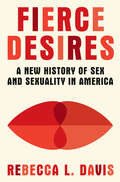
Fierce Desires: A New History of Sex and Sexuality in America
Par Rebecca L. Davis. 2024
From an esteemed scholar, a richly textured, authoritative history of sex and sexuality in America—the first major account in three…
decades. Our era is one of sexual upheaval. Roe v. Wade was overturned in the summer of 2022, school systems across the country are banning books with LGBTQ+ themes, and the notion of a “tradwife” is gaining adherents on the right while polyamory wins converts on the left. It may seem as though debates over sex are more intense than ever, but as acclaimed historian Rebecca L. Davis demonstrates in Fierce Desires, we should not be too surprised, because Americans have been arguing over which kinds of sex are “acceptable”—and which are not—since before the founding itself. From the public floggings of fornicators in early New England to passionate same-sex love affairs in the 1800s and the crackdown on abortion providers in the 1870s, and from the movements for sexual liberation to the recent restrictions on access to gender affirming care, Davis presents a sweeping, engrossing, illuminating four-hundred-year account of this nation’s sexual past. Drawing on a wealth of sources, including legal records, erotica, and eighteenth-century romance novels, she recasts important episodes—Anthony Comstock’s crusade against smut among them—and, at the same time, unearths stories of little-remembered pioneers and iconoclasts, such as an indentured servant in colonial Virginia named Thomas/Thomasine Hall, Gay Liberation Front cofounder Kiyoshi Kuromiya, and postwar female pleasure activist Betty Dodson. At the heart of the book is Davis’s argument that the concept of sexual identity is relatively novel, first appearing in the nineteenth century. Over the centuries, Americans have shifted from understanding sexual behaviors as reflections of personal preferences or values, such as those rooted in faith or culture, to defining sexuality as an essential part of what makes a person who they are. And at every step, legislators, police, activists, and bureaucrats attempted to regulate new sexual behaviors, transforming government in the process. The most comprehensive account of America’s sexual past since John D’Emilio and Estelle Freedman’s 1988 classic, Intimate Matters, Davis’s magisterial work seeks to help us understand the turmoil of the present. It demonstrates how fiercely we have always valued our desires, and how far we are willing to go to defend them.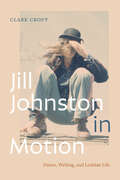
Jill Johnston in Motion: Dance, Writing, and Lesbian Life
Par Clare Croft. 2024
Performer, activist, and writer Jill Johnston was a major queer presence in the history of dance and 1970s feminism. She…
was the first critic to identify postmodernism’s arrival in American dance and was a fierce advocate for the importance of lesbians within feminism. In Jill Johnston in Motion, Clare Croft tracks Johnston’s entwined innovations and contributions to dance and art criticism and activism. She examines Johnston’s journalism and criticism—in particular her Village Voice columns published between 1960 and 1980—and her books of memoir and biography. At the same time, Croft attends to Johnston’s appearances as both dancer and audience member and her physical and often spectacular participation at feminist protests. By bringing together Johnston’s criticism and activism, her writing and her physicality, Croft emphasizes the effect that the arts, particularly dance, had on Johnston’s feminist thinking in the 1970s and traces lesbian feminism’s roots in avant-garde art practice.